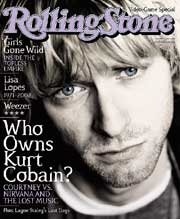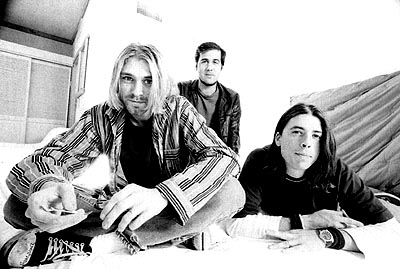 |
The Nirvana Wars: Who Owns Kurt Cobain?
By
Chris Heath |
|
In
1994, on a late January Sunday in "It's basically just the
quiet-loud dynamic with lots of noise," says Dave Grohl.
"I think it came out of a jam. . . ."
"It was just something we
were working on," says Krist Novoselic.
"Something to take our mind
off playing 'Smells Like Teen Spirit' every night," says Grohl.
Afterward, Novoselic took home
the master tapes and put them in his basement. Just over two months
later, Kurt Cobain killed himself in a room above the garage of the
You know you're right" -- which remains unreleased despite the fact that no one involved disputes its quality -- is neither the cause of, nor the key issue in, the current fight over Nirvana's legacy; it's just one of the battle's pawns and, for the moment, one of its hostages. It was retrieved from the basement so that it could be included on a Nirvana box set scheduled for release last October, but neither it nor the box set has appeared. Now that Cobain's widow and primary heir, Courtney Love, is at loggerheads with his former band mates, there's no agreement there should even be a box set, or about much else. Lawsuits and legal motions have been flying back and forth for the past year; alongside them and in their shadows, all manner of accusations are being exchanged. Love says that, on the day
"You Know You're Right" was recorded, Cobain got home late
and she'd been worried. She heard he'd left the session saying that
he needed a nap but would return, and that he never returned because
he went to score drugs. Eventually, Cobain would bring home a tape
of what he described to her as "a really sick, good
Love strongly favors a single-CD
Nirvana best-of package over the proposed box set. "I
want to make sure that this record sees its way through to the kind
of packaging, the kind of quality, the kind of mix, the kind of
mastering, the kind of everything that Kurt deserves. This is ugly,
but I'm ready for it. It's not a big deal. Compared to some aspects
of my life, it's nothing. And if it means protecting my kid and
protecting Kurt's legacy." Though this battle unfolded only
last year, it has its roots in the business arrangements put in
place after Cobain's death, and also, earlier, in the complicated
relationships between Cobain, Love, Grohl and Novoselic when Cobain
was alive. When they address the conflict, each side finds it
difficult to believe that the other side's motivations, in any
particular instance, are anything other than the worst they could
possibly be.
Their
basic positions are as follows: As far as Novoselic and Grohl are
concerned, Nirvana was a three-way partnership. The business
structure put in place before Cobain's death reflects this
arrangement: For the biggest decisions, Novoselic, Grohl and Cobain
had to agree. Novoselic and
Grohl contend that this worked fine until Love began firing
torpedoes last year as the designated representative of Cobain's
estate, demanding everything be dismantled. They
believe Love is causing a fuss because she can't bear not getting
her own way, because she is an attention seeker, out of greed and as
a bargaining tool in her lawsuit against Universal, Nirvana's label.
They have now countersued, asking the court to remove Love from the
Nirvana partnership and to replace her with a less contentious
representative of Cobain's estate.
As far as Courtney Love is concerned, Kurt Cobain was Nirvana. He controlled the group, wrote the songs, and the other two members were only sidemen. He used a group name only because that was the romantic ideal in those days. She contends that when the Nirvana partnership was formalized, she was still in a bad way after her husband's death, was poorly advised by lawyers, and misled by Grohl and Novoselic's representatives. So she signed the agreement, a move she now bitterly regrets. Love says, regarding Nirvana's business affairs, that Novoselic and Grohl take no notice of her opinions, routinely outvote her on everything and have been poor stewards of her husband's legacy. She believes it to be a huge wrong that, as things stand, Cobain's daughter, Frances, will grow up with only a minority say over how her father's records and other Nirvana products are handled, and it is a wrong Love has vowed to right At the heart of the conflict is the Nirvana Limited Liability Company, which was set up after Cobain's death. During Cobain's lifetime, Nirvana shared royalties from record sales evenly, one third each. Cobain, who wrote the lion's share of the songs, separately collected the largest cut of the publishing income. (Though it has been reported otherwise, Grohl and Novoselic share in publishing royalties on only eleven Nirvana songs - including 12.5 percent each of "Smells Like Teen Spirit.") Love contends that Cobain shared
record royalties only out of kindness. Grohl and Novoselic contend
that, though Cobain was the band's leader, the even split reflected
how decisions were made in Nirvana. Whatever the case, the way the
LLC was drawn up mirrors Grohl and Novoselic's position: aside from
publishing, money and control are evenly split among Grohl,
Novoselic and Love.
Love believes that Cobain
controlled the group in life and so his estate should have the same
control now. She also argues that between publishing and record
royalties, the majority of income generated by Nirvana goes to
Cobain's estate; therefore, the estate should have a majority say in
the management of Nirvana. Though there are some financial
implications, the Nirvana wars are not primarily about money, they
are about control.
Rolling Stone Magazine © 2002. All rights reserved. |
 "Up in the list of horrors
and bad things that ever happened in the history of rock &
roll," Love declares, "this is up there." She scoffs at what she
terms Novoselic and Grohl's "whole buddy-buddy thing."
"Up in the list of horrors
and bad things that ever happened in the history of rock &
roll," Love declares, "this is up there." She scoffs at what she
terms Novoselic and Grohl's "whole buddy-buddy thing."